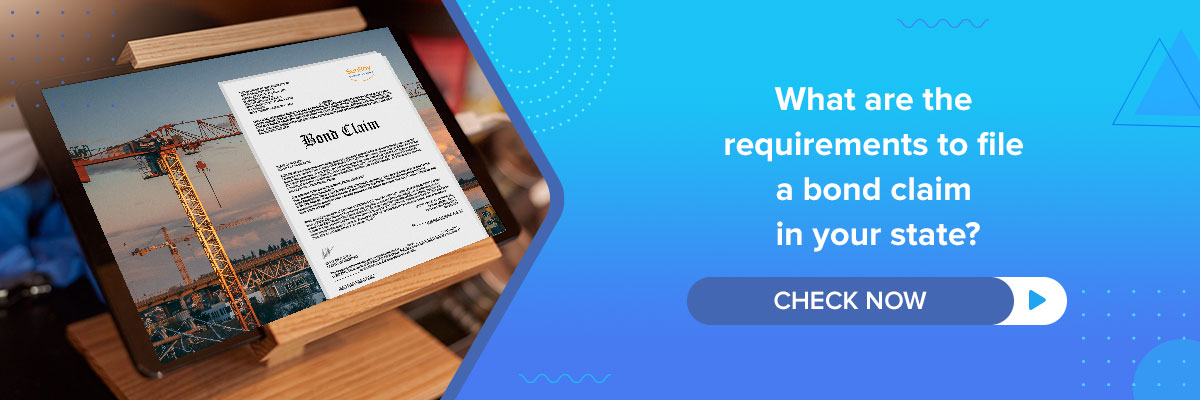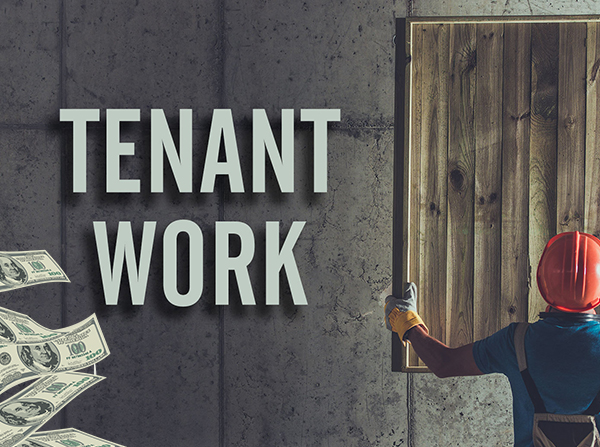I Sent a Bond Claim/Notice of Nonpayment. Now What? - Webinar
You sent a bond claim/Notice of Nonpayment, now you should know how to get paid! Understand whose payment bond you can make a claim on, if you need a proof of claim, and how to file suit.
Last updated:
Dec
19
,
2025
Published:
Jun 08, 2022
9 Mins
Read
After sending a bond claim or Notice of Nonpayment there are some things you can do to increase the likelihood of getting paid and get paid faster. To understand how to do that, you should also understand the relationship between the surety and principal, know what happens when the surety gets your claim, whether or not you should complete the Proof of Claim, how long you should wait to get paid, and how to file suit to enforce your rights.
This blog comes from a webinar that was presented by SunRay Construction Solutions and Alex Barthet. Alex is a board-certified construction lawyer who serves clients in Florida. On the agenda for discussion in this blog is what happens after you submit your Notice of Nonpayment. Because the end result for you is that you want to get paid. So we are going to talk about what happens after you send your Notice of Nonpayment, and things you can do to increase the likelihood or reduce the time it takes to get paid.
Understanding the surety-principal relationship
If you are a subcontractor, supplier or sub-subcontractor, and you have a contract with a contractor or you have the right to make a bond claim, that person or contractor is called the principal in this three-party agreement between the principal surety and oblige.
a. Principal/contractor applies for bond
The principal applies for a bond so they can become bonded as part of the underwriting process when contractors want to become bonded.
b. Surety gets indemnity from principal/contractor and its owners individually
The surety, which is effectively an insurance company that is able to write surety bonds in the state that you are in, has the contractor/principal sign what is called an indemnity agreement. An indemnity agreement is an agreement that says something like “I, the principal, agree to pay back the surety for any losses that the surety may suffer.”
Unlike car insurance where if you get in a car accident, all you need to do is pay your premiums and if you total your $20,000 to $30,000 car, they will cut you a check. They are not asking you to pay them back for that car.
Suretyship is very different. If the surety writes a check, they are going to look to their principal to recover all of the costs and fees associated with the loss. So, to do that, they get what is called an indemnity agreement. That agreement is typically signed by the contractor who is bonded and many times by the owners of the construction company individually, and usually also their spouses. So, they are on the hook and many times personally on the hook.
c. Surety issues bond
Once the surety is satisfied that they have their underwriting taken care of, they will go ahead and issue bonds to the projects that the contractor asked them to issue bonds on.

d. Surety owes duty to principal/contractor and oblige/claimant
The surety owes a duty to both the principal contractor and the oblige claimant – that is you. They sit in the middle of this relationship where they have to do right by the principal as well as to you, the oblige. It is that pull and tug that the surety is in the middle of that sometimes creates conflict.
What Happens When the Surety Gets My Claim?
Now we will talk about what happens after you submit your claim to the surety.
a. Surety sends a letter to the principal/contractor asking about the claim
The first thing that happens is when the surety receives the Notice of Nonpayment, is they will prepare two letters. The first letter is a letter to the principal contractor asking them about the claim.
So, they will take the information that you submitted, send it to the contractor, and that letter typically says that they received the claim from this claimant and to give them more information about it. You will also be asked whether you believe it is due and owing or not.
b. Surety sends a letter to the oblige/claimant asking for backup
At the same time, the surety sends a letter to you, the oblige claimant asking for backup. We will discuss the Proof of Claim later because one of the documents that they are going to send you, is the Proof of Claim form.
Once the surety sends out the two letters, they then wait for responses back from both the principal, the contractor, and you the oblige claimant.
Do I Need to Complete the Proof of Claim?
a. What is the Proof of Claim?
Most sureties will submit a blank form to you with lots of lines on it that they ask you to fill in with pertinent information about your claim, like when you started, when you finished, whether you owe anyone any money on the job, how much you are owed, and how much you built.
b. Do I need to complete it?
You will have to attach all the back up and then they will ask you to sign and swear under the penalty of perjury that everything you submit is true and accurate. In most states, including Florida, the sureties send these claims. But in Florida, and most other states, you do not have to respond to that Proof of Claim. There is no legal obligation to do it.
There is a perception that if you do not submit the Proof of Claim that the surety will not pay you. We will talk about when the surety will and will not pay you.
c. What happens if I do not complete the Proof of Claim?
Again, in Florida, there is no legal obligation to submit the Proof of Claim. So, if you do not submit it, that is not a reason for the surety not to pay you. They will sometimes tell you that that is the reason they will not pay you, but legally that is not a permissible defense in most states. If you complete it and you submit it, the surety will take that backup and the Proof of Claim.
They will typically send it back to the principal contractor and give them the backup that they received from the claimant. They will then ask for the principal contractor’s position on the claim.
How Long Do I Need to Wait to Get Paid?
Once you submit the information to the surety, let us assume that you decide to submit the Proof of Claim and your backup because you are thinking that you have nothing to hide.
Read more: How Do I Get Paid After I Make A Payment Bond Claim
a. What you think the surety is doing
Well what happens is that the surety will investigate your claim. They have an adjuster who would have written the letter to you. He/she will talk to the contractor and the owner and try to get to the bottom of the situation.
Effectively, many people believe that the surety representative is acting as your advocate with the goal of trying to get you paid.
b. What the surety is actually doing
Let us now talk about what the surety in many cases does. It is usually not much of anything. They receive your Notice of Nonpayment and backup, they submit it to the contractor, and in most instances unless the principal/contractor is willing to pay the bill, the surety is not going to voluntarily write a check. Recall the earlier mentioned indemnity agreement that the surety has with its contractor.
If the surety writes a check, they are going to go back to the principal and say that they wrote a $40,000 check to this claimant, and to pay them back. The surety does not want to be out of pocket if they can avoid it. So, in many instances, and especially when you have larger and financially sound contractors that are bonded, the surety will do what the contractor principal tells the surety.
So, the primary defense that the contractor has is that the owner has not paid them. In Florida and in most states, that by itself is not a valid reason for a surety not to pay a claimant. The fact that the owner has not paid the contractor is not a defense for the surety not to pay a claimant if that is the only defense.
What happens is that the contractor tells the surety that they will deal with the situation. So, the surety puts the matter on ice and leaves it to the contractor to try to resolve it.
How Do I File Suit to Enforce My Rights?
Now the question is what to do if you are not getting the response that you need so that you can get paid. To file suit to enforce your rights, is effectively the next step if the surety is unwilling to pay you, and you do not have another reason to wait.
a. The 60-day rule
The most effective time frame to file suit is about 60 days after your Notice of Nonpayment.
For example, you can send a Notice of Nonpayment today and then file a loss the next day. In most instances and in most states, there is no obligation to wait longer than the day after you file your Notice of Nonpayment. So, you do not have to wait a specific period of time. Sometimes it is worth your while to wait because maybe you can get paid without having to pay suit.
But around 30 to 60 days after you have submitted your Notice of Nonpayment and if you have not been paid then, you should think about filing a lawsuit to enforce your rights. Because what we normally find is that waiting too long is not necessarily going to get you paid.
b. Why waiting longer may be a good idea
But now let us talk about why you may want to wait longer. Those reasons are typically business reasons. You may have a good working relationship with this contractor who is the principal on the bond. You may have six jobs going with them, and those jobs may all be bigger than the one that you are owed money on.
As long as you do not lose your rights, you may decide for business reasons to keep waiting. So, for business reasons, you may decide to wait. But if you do not have a business reason to wait, then waiting will not help you get paid.
A Few Secret Tips and Tricks
Now we will discuss a few tips and tricks.
a. The squeaky wheel gets the grease
The first thing you need to know about any type of collection is that the squeaky wheel gets the grease. Once you submit your Notice of Nonpayment and you submit the backup, then you should be calling the claims handler at the surety on a regular basis. You should ask about the status of your claim. Do that weekly and you should also send emails. You need to be a pain. The more difficult and persistent you are about getting to the bottom of why you have not been paid, the better off you will be.
b. Do not wait too long
So, always remember that you should not do nothing after you submit your claim. You need to spend time and effort following up with the people who owe you the money. If you decide to wait, you want to make sure that you do not wait too long.
For example, there was someone who waited too long and lost their rights. He submitted a Notice of Nonpayment, received the letters we spoke about above, and then every month or two, they would follow up with the surety asking about the status. He would get a generic response that it was being looked into and that the project would finish up.
He decided to keep waiting. In most states, and in Florida specifically, the limitation period to file suit on a surety bond claim is one year from your last work on the job. So, about a year and a month later, the person received a letter from the surety that said the claim was denied because it was past the time period for the claimant to file suit on the payment bond.
This man, thinking that the surety was actively investigating its claim, trying to get to the bottom of why it has not been paid so that it could be paid, was just waited out and he lost his rights on the payment bond.
So, under no circumstances should you wait past the period of time that you have to file suit under the law under your bond claim.

c. Sub-subcontractors and material subcontractors, look for sub-bonds
Finally, if you are a sub-subcontractor or a material supplier to a subcontractor, do not forget that on larger jobs, the subcontractor that hired you may have their own bond an addition to the contractor's bond. You may want to make sure that you assert the rights that you have against every bond that exists above you in the chain of contracts.
So, if the general contractor has a payment bond, you want to make a claim on that. You also want to find out if the subcontractor that hired you also has a bond, and you can make a claim against that surety as well. Sometimes the sureties will incorrectly tell you that you have to pick one and go after that one.
But nothing could be further from the truth. You have every right to pursue both bonds, and between the two of them, they get to figure out who is going to write the check. If you have multiple bonds you can pursue, you want to make sure that you do that timely and effectively.
Sunray Construction Solutions offers professional "Notice to Owner Florida" services to help you secure your mechanics lien florida rights in the construction industry. Looking for a free Notice to Owner form in Florida? Get your free, editable "Florida Notice to Owner Template" today for easy and accurate preparation.
Protect Your Rights with a Notice to Owner
Sending a notice to owner is the first step to secure payment on construction projects. Learn how a notice to owner Florida helps protect your lien rights and ensures you get paid.
Protect Your Payment Rights with Florida’s Most Trusted Notice & Lien Services
Notice to Owner – Secure your lien rights early. File your NTO now!
Notice to Owner Florida – Stay compliant with Florida deadlines. Send your NTO today!
Mechanics Lien Florida – Get paid faster. Start your Florida lien process now!



.jpg)








